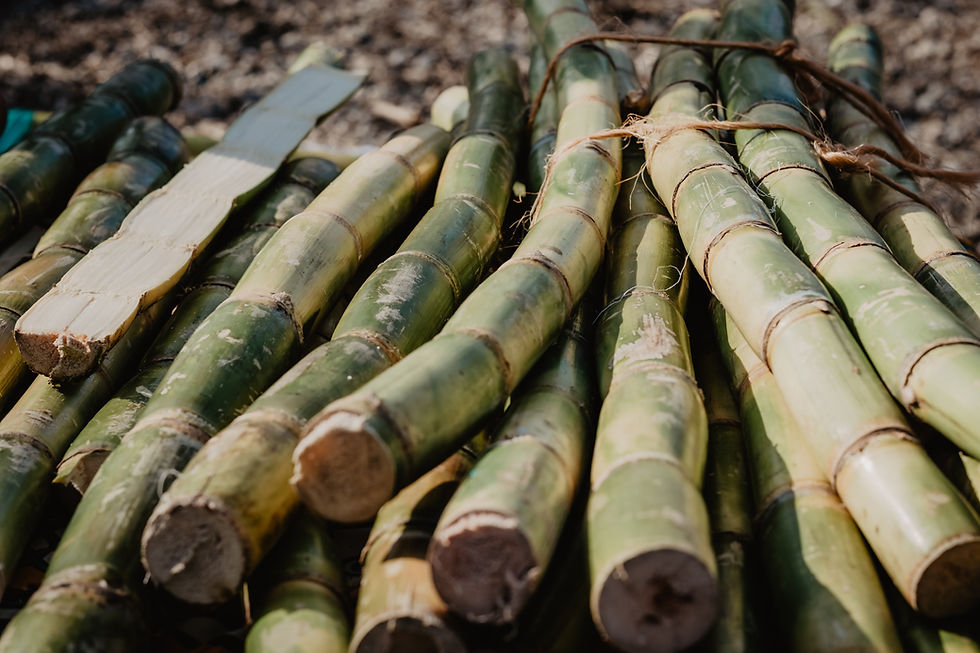SEASON 3.1: ALCOHOL
- SOURCED
- Feb 16, 2022
- 3 min read
Updated: Apr 27, 2023

For the next four months we’ll be looking at the ingredient of Alcohol - as always, we’re keen to explore this topic in as wide a way as possible, and try and re-think some assumptions. There are two things we’re particularly keen to think about. Chloe is interested in how alcohol features in and is part of celebrations, the joy and occasion and the connectivity. Anna wants to remember that booze is part of the farming cycle, and explore that connection between seasons and the soil (and not just with wine!).
We started the new season coincidentally with Lunar New Year which is celebrated throughout countries in the East and South East Asian continent. This celebration is based on a lunisolar calendar, a marking of the time that is based on the movement between moon and sun, and is directly related to an agricultural calendar. The traditions surrounding Lunar New Year varies from place to place but throughout it’s celebration marks the end of winter and the beginning of spring, a new agricultural year. This time particular calendar was developed in China primarily between 770 – 476 BCE and was subsequently used across Mongolia, Korea, Taiwan, Japan and down to Vietnam – amongst other places and all their encompassing diasporas.
This connection between agriculture, celebration and ritual feels so appropriate to what we believe in at Sourced, chiefly that food and drink and cultural and biological rights.
But what do we really mean by that? In Alcohol season we will explore this a little further because unlike a staple crop like wheat, alcohol takes up a different space in our culinary landscapes. Alcohol is a complicated ingredient equally revered as a sign of taste and sometimes tainted as a cause of ‘vice’. Its history is both medical and social. Like the murky concept of a ‘food system’, alcohol is an ingredient that is extremely complicated.
Alcohol suggests an excess. In the agricultural sense, the process of fermenting alcohol is used as a means to prevent wastage of excess crop. The time required for alcoholic fermentation necessitates space and an excess of time. Excess is also cause for celebration and partially why alcohol is incorporated in so many celebrations, especially ones like Lunar New Year that are centred on agriculture.
Excess of alcohol has a history all of its own as well. Excess consumption leads to intoxication which is why it is not allowed in many faith traditions and was the cause of prohibition legislation in places like the United States. As an intoxicant, excessive alcohol consumption can also trigger addiction – a disease too often experienced in high-stress occupations like hospitality.
This season we want to explore these aspects. We want to explore how alcohol - or lack of alcohol - fits into lives, builds economies, creates identities. How does the ingredient of alcohol create systems and how do we partake in these systems?
For the first week of the season we highlight some alcohols that are drunk in places that celebrate Lunar New Year and of course included links to further reading! So our reading list starts with those pieces, and we will also continue to update this reading list as the season continues.
ARTICLES:
From our launch on instagram:
Soju and it’s modernization, in 10 Magazine
Various articles about Chinese wine, by Li Demei
The history of rice wine, in Saigoneer
The Mongolian drink, airag, is outlined in this Unesco article
Bernot
Waiting on the Tides — How Outdated Liquor Laws Trap Craft Brewers Between Regulation and Rebellion, by Jerard Fagerberg
BOOKS:
Smashing the liquor machine: a global history of prohibition by Mark Lawrence Schrad
This is a tome! But is an excellent insight into understanding the various national projects against alcohol
Imbibe, by David Wondrich - editors note: this book is interesting, but please read with other references as it is very much through the lens of a white man and the global north. There could be a fair bit of history missed or whitewashed.
BLOGS / MAGAZINES
Pellicle magazine - beer, cider, wine
Shut Up About Barlcays Perkins - a very niche beer blog, investigates antique recipes
TO LISTEN:
Whetstone’s new duo-lingo podcast looking at mezcal El corredor del néctar
This episode of You’re Dead To Me podcast is a very fun romp through the background history of prohibition in the US, and doesn’t shy away from the tough topics.










